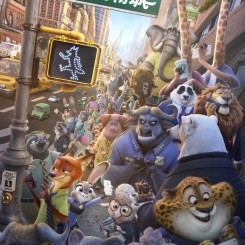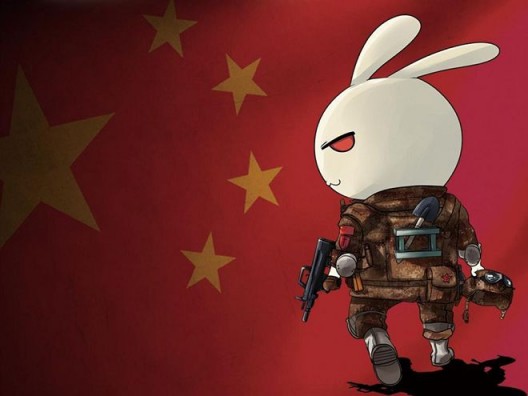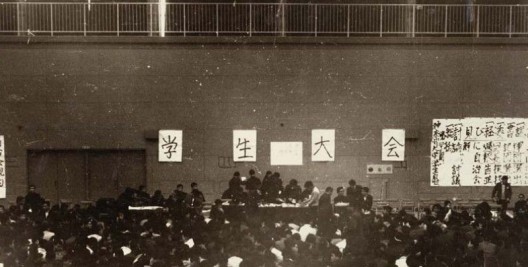This piece is included in Ran Dian’s print magazine, issue 4 (Winter 2016–2017)
As we grow stronger as a nation and our cultural output expands, the historical narratives projected by our literary and artistic products seem, conversely, to be in the midst of a great moral degradation. The sense of deep hatred once inspired in audiences by anti-Japanese film and TV dramas has now given way to an eye for the absurd, evidenced by the internet’s ridiculing of the “shredded devil,” or shousi guizi—referring to a moment in one such show in which a female character rips a Japanese invader in two with her bare hands—or “crotch bomb” (kudang canglei), the internet’s term of endearment for a scene in Sino-Japanese war show Fighting Together Against the Devils, in which a female character hides a grenade in her pants. The rather mediocre production quality of “Anti-Japanese drama” shows the way to enumerable branches into cult sub-culture. Meanwhile, Lin Hao’s webcomic, “Year Hare Affair,” a cartoon narrative of the history of national defense, is thought to wrap nationalist, expansionist political views in a new, “cute” package. A first for modern times, our historical narratives are moving out of tragedy and into comedy, and like it or not, this will be a major turning point.
The mainstream international political order as it exists now was established on the basis of the Second World War and Cold War. Changes in perception with regard to those wars will lead to a transformation of this order. Continental Europe in the latter half of the twentieth century could be considered a civilization lacking in imagination with regard to (a new political) order. A certain aura of profundity found in the arts of Europe left a deep impression on China, and capturing the philosophical model on which this aura rested was not difficult to achieve. It was indeed existentialism that was the prominent school of thought to arise out of continental Europe’s postwar experience.
Whether it be the humiliation of being the conquered or the guilt of having trampled on others, when it comes to ethical crises that are near unbearable for a national consciousness to stomach, existentialism has always been a most effective pain-killer. Almost all existentialists have experienced national moral traumas. Furthermore, there has been a high concentration of such traumas in those countries that were once proud standard bearers of modernization. The student movement in Europe in 1968, the Japanese Red Army (Rengo Sekigun), and other student protest movements were never so much Leninist usurpations of power as they were existentialist, ethical ruptures, whereby young people attempted to break from the humiliations or crimes of their parents’ generations.
The Japanese youth wanted to bypass apologies for the atrocities of the war and go straight to being Mao’s good soldiers and “international comrades” of the Chinese revolutionary youth. It was not so easy, however, for them to distance themselves from the unforgivable sins of their fatherland. During an armed confrontation between Japanese police and 25,000 left-wing youth who opposed the construction of the Narita Airport, upon receiving the news that Nixon had arrived in China, the police summoned the mother of a young member of the Japanese Red Army to speak to her son through the loudspeaker: “Times have changed. The U.S. President and Chairman Mao have shaken hands. You have accomplished the task entrusted to you by Chairman Mao. Come back home, my son.” That son shot his mother dead.
For students in these protest movements, would-be impossible choices became possible ones. Ultimately, however, they failed to care for themselves. During periods of confidence in their own revolutionary work, the Chinese students did not broach the question of whether or not to be Chinese citizens at all. China needed internationalization and modernization; Marxism needed Sinicization—that was that. If something was not an option within the given framework it was unnecessary anyway, and with regard to what could be changed, or what was worth sanding down a little bit, every individual was able to use his or her own practical judgment. But in the aftermath of that famous defection, educated Chinese youth began the soul-searching process in droves, reading Chinese translations of foreign classics. Existentialism would become the painkiller of this generation as well.
The choice not to be Chinese— whether through exile, opposing tradition, introducing foreign cultural programs, or establishing small organizations—seemed possible, feasible, and even worthwhile. Existentialism gave rise to the mutation of liberalism, and the practical applications of freedom became further and further removed from the definition of “liberal-ness” as a set of open-minded ethics. The young people of Europe, Japan, and China broke away from their national identities, leaving painful wounds behind and paying an extraordinary price for it. Like a fairytale, this scenario happened in one country after another, true for both the invaders and the invaded countries alike of the twentieth century. The United States was the visible exception, being neither an invading nor an invaded country during the Second World War and possessing what seemed to be some kind of geo-spiritual advantage paralleling its geo-political one. This also resulted in what became a kind of low psychological tolerance on the part of the Pentagon; if any country dared to act more than twelve nautical miles from its own shores, it was essentially an invasion of US soil.
Comedies are not merely a pile-up of punch lines. To a certain extent, they can be more politically potent than tragedies. Great comedies draw on a larger sense of human order. The aesthetic material of tragedy is the order of the collective ceremonial moment, while the stuff of comedy is the greater order of the timing of life. Aristotle observed long ago that comedy was the imitation of something low, and tragedy the imitation of something high. In a tragedy, that higher, sublime law tears apart the fate of the characters; an ill-timed tragedy will even tear at the fibers of our very sense of political life. Comedy will often deal with things lower than what we normally experience, and will critically expose the reality of our problems in doing so. The outcome is often the high and the low preserved within one another—which is, in fact, an affirmation of the possibility of order itself.
In America, political comedy is a tradition with rich, deep roots. The liberal-leaning news satire talk show The Daily Show with Jon Stewart is widely popular among Chinese netizens. Zootopia, an animated political comedy film, is considered a godsend by Chinese film buffs with more limited exposure. A great political comedy needs to accomplish three things: astutely capture the core and origins of the political thesis of the era; provide a textured presentation of complex and interwoven realities; and extract from all of this the essential formula to arm the masses with resolve, by convincing them that problems are solvable and order is attainable. Quentin Tarantino, a comedic genius in the American style, uses strong political satire in his two films, Django Unchained and The Hateful Eight. The stick of discrimination against Mexicans and African Americans in these works came true in Trump’s presidential campaign this year. In The Hateful Eight, a “constitutional” sense of trust between whites and blacks that seems to stem back to the constitution taking on a sacred quality in a plot centered on a fictionalized “Lincoln letter” protecting Samuel L. Jackson’s character; only a true political optimism that authentically unravels the real, immediate danger people are facing right now is believably impactful, and only a true genius comedic auteur could pull off a balance so sensitive.
The Hateful Eight is one of those masterpieces that has a lot to teach directors of homegrown films like Gone with the Bullets (Yi Bu Zhi Yao). Chinese writers today still hold onto remnants of their ambitions to indulge in nostalgic work, with a nod to the European tradition devoid of political re-imagination: a move that fails to keep up with the zeitgeist of the times, in which netizens are marching closer towards political maturity, watching programs with greater depth. In China it was first Wang Shuo, then Stephen Chow, and now Xu Haofeng who have revived a radicalism derived from existentialism. In his Judge Archer, Xu Haofeng has retired warlords make their appearance in Taoist monk’s robes, accordions in hand. The works of these artists are populated with memorable jokes reflecting political issues. They point out extreme truths that are often excruciating to absorb, but if the humor is forceful enough it can helps us unload the piss we’ve been holding in out into the urinal of reality.
In this the era of the “crotch bomb,” Chinese contemporary art is undergoing a transformation as well. The aesthetic tides of radical liberalism, existentialism, and anarchism have all successively ebbed as their respective political powers of interpretation have grown obsolete; from its beginnings, Chinese contemporary art’s main historical mission, first and foremost, has been to justify itself politically. Looking back, it is clear that Wang Xingwei’s “Large Rowboat” (2006) had the power to predict at least five years into the future. Once one realizes this, it would stand to reason that one should be able to figure out what to do with the next five years so as not to miss a beat. But the fierce conflict between Wang Xingwei and Ai Weiwei’s art symbolizes the mutability of the political function of the arts, as thought-provoking as the classical poetry Wang Xingwei wrote for Liao Guohe’s new exhibition.
Wang Jiyu is a curator and artist. He is also Chief Editor of ideological journal Anabasis. Wang received his Masters degree in Experimental Art from the Central Academy of Fine Arts in Beijing. He has written articles about philosophy and art for publications including Revelation, Reason 06, and LEAP. Major curated exhibitions include, in 2015, “The Civil Power” at Beijing Minsheng Art Museum and “Post-Tradition and Its Origins” at UCCA, Beijing, in 2013.



